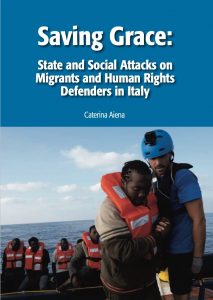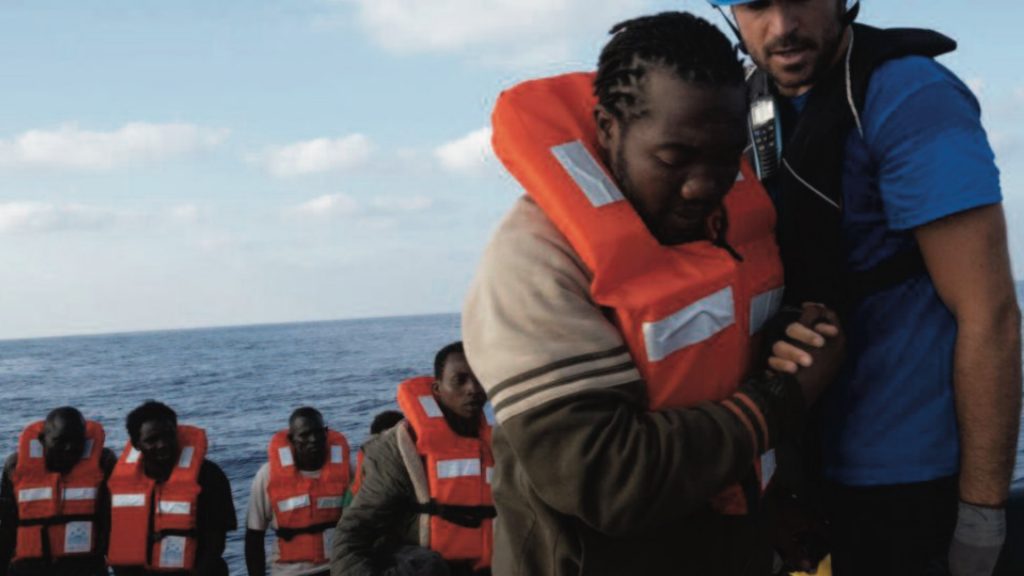 Caterina Aiena’s compelling 2021 report, based on IHRC fieldwork in Italy, a robust analysis of international laws and obligations and practical recommendations, is a must read for anyone interested in the so-called migrant crisis.
Caterina Aiena’s compelling 2021 report, based on IHRC fieldwork in Italy, a robust analysis of international laws and obligations and practical recommendations, is a must read for anyone interested in the so-called migrant crisis.
Published by Islamic Human Rights Commission / 144 pages / Paperback ISBN 978-1-909853-26-3 / Electronic ISBN 978-1-909853-27-0
EXECUTIVE SUMMARY: Conceived under “Salvini’s rule”, this report responds to the compelling need of understanding how and when, suddenly, Italy has discovered itself as one of the most racist countries in civilized Europe. Poisoned by incendiary tones and daily brutality by the ever-growing far-right and populist national parties and movements, Italian society unveiled an aggressive and violent face, in contrast to the frame of “Italiani brava gente” (“Italians decent people”), evocative in the collective imaginary of a somewhat “indefinite Italian-styled” humanitarianism and sympathy to the others. The problem of ‘racism and hate speech’ is a social emergency in Italy.
Consistently, Italy has experienced an increase in the number of reported ‘hate crimes’ based on ethnicity and religion. In this context, NGOs have been increasingly targeted by punitive measures by the political elite and by smear campaigns often exploited by compliant biased traditional and social media. The main objective of this report is to provide a rounded picture of the country and its out-of-sight internal dynamics that have irreversibly modified the cultural fabric and the traditional value system of reference. In addition, this report attempts to lay out the operation and operationalisation of racism in political discourse and policy in Italy, accelerated by but not caused by the mass migrations that took place in the last decade. It also provides a legal overview of Italy’s international obligations.
This report provides a socio-political landscape of Italian society and the contextual political background behind the management of the migratory flows in the pre-Salvini era (chapters I and II). In chapters III to VI, the report underlines the legal responsibilities and framework that past and current Italian governments should have been working under and highlight the repeated violations of such, with a particular attention on the impact of the two Salvini on society as a whole. In chapter VII, the report seeks to expose both the narratives employed, their utilisation of anti-Muslim and other racist and xenophobic tropes that now attach not simply to migrant, and other minoritized communities, but also activists and civil society organizations through the prism of the Domination Hate Model of Intercultural Relations (DHMIR) and the Counternarratives to Islamophobia project (CIK). 3 In Chapter VIII, the report overviews the findings of fieldwork and survey work by IHRC with Italian civil society organisations working in the field, in order to present recommendations to civil society, the Italian government, relevant local and national authorities, media and law enforcement institutions and the EU, on what needs to happen to restore civility into the national and regional conversation, uphold international law and states’ obligations under it and ameliorate the situation of refugees and other minoritized groups.
The main objective of this part remains that of filling the gap between EU and its “South”, as predominantly emerged during interviews and conversations with local stakeholders who lamented a sentiment of ‘being abandoned” by the EU institutions. To conclude, the methodological framework is based on a mixed-methods approach, which integrates qualitative and quantitative approaches, including interviews, literature review, primary and secondary data collected from international, national or regional official sources. Often hidden under a subtle and sophisticated rhetoric, social and political actors can talk against immigrants, refugees, minority members as undesirable but avoid being labelled as “racist”.
A huge amount of open and disguised racist content is currently published on the Internet. Often brushed off as supposedly occasional bigotry or individuals’ outburst, they instead foster racist attitudes among people and work to “normalise” racism – so-called “common sense racism”.
Please email info[At]ihrc.org if you want a hard copy version for work or review.
For further information please email caterina@ihrc.org 4 www.ihrc.org.uk or contact the IHRC office on (+44) 20 8904 4222 or email info@ihrc.org.






